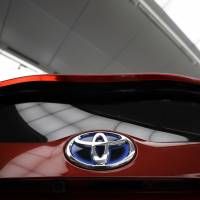Toyota Motor Corp. is mulling issuing up to ¥100 billion ($900 million) in bonds with maturities of up to 20 years to invest in developing next-generation car technologies, sources close to the matter said Thursday.
Toyota plans to spend around ¥1.05 trillion on research and development this business year as competition in developing driverless technologies grows. Toyota is likely to use the money to fund ways to upgrade its automated driving and safety technologies.
Toyota's cash reserves exceeded ¥7 trillion as of March 31. But since the Bank of Japan's ultra-loose monetary easing policy has pushed down funding costs, the carmaker has apparently decided to secure long-term funds under very favorable terms.
This would likely be the largest bond issuance by Japan's largest carmaker since it raised ¥120 billion in 2009.
In addition to 20-year bonds, Toyota is also considering issuing bonds with maturities of three, five and 10 years. It will decide on the specific issuance terms by the end of next week, the sources said.
The bonds are likely to be sold mainly to financial institutions because the minimum purchase amount will be ¥100 million, but private investors will also be able to buy them.
Toyota was initially planning to issue 30-year or 40-year bonds, the longest it uses, but apparently dropped the plan after failing to come to terms with institutional investors.
The BOJ's unorthodox easing measures, which include charging negative interest on some commercial bank reserves held at the central bank, have boosted the issuance of corporate bonds with maturities lasting more than 10 years.
In May 2016, Toyota raised some ¥60 billion by issuing bonds, including 20-year debt, for the first time in 18 years.
West Japan Railway Co. (JR West) issued 40-year bonds in February 2016, marking the longest maturity on a bond issued by a private company in Japan.




